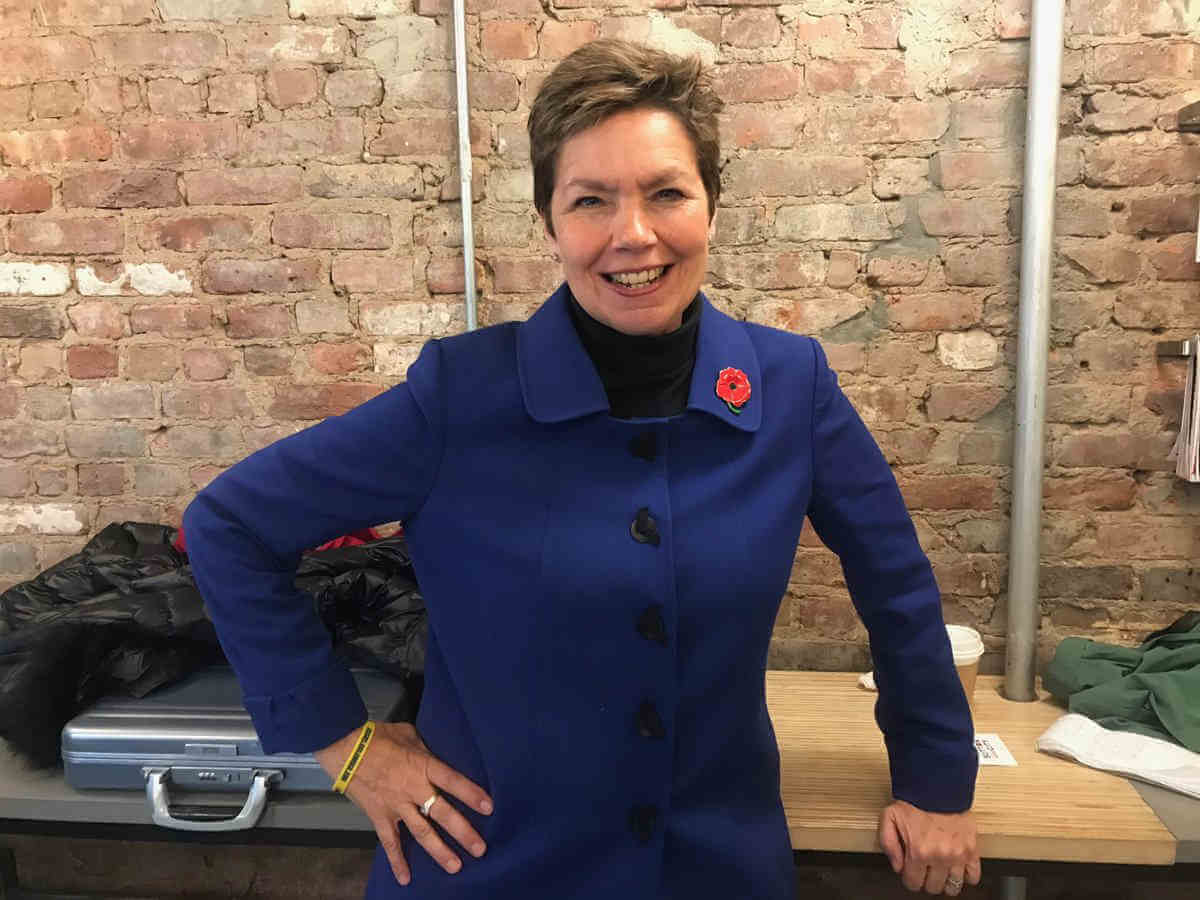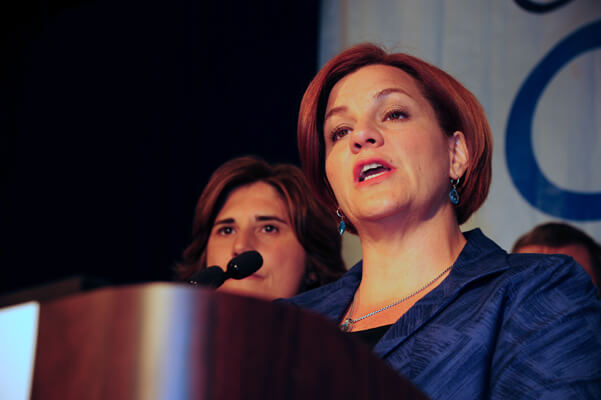Nearly four decades before Loree Sutton decided to run for mayor of the nation’s biggest city and well before she became an Army psychiatrist and decorated brigadier general, she filled out a form to join the military.
None of the questions on that form seemed out of the ordinary — not at the time.
“I was asked, ‘Have you ever engaged in homosexual conduct?’ ‘No’ was an easy answer,” Sutton recalled during an interview with Gay City News the week of Veterans Day. “I didn’t think anything about it because I didn’t think that was who I was.”
Now the bubbly, cheerful, and energetic 60-year-old 2021 mayoral hopeful, fresh off a stint as the founding commissioner of the city’s Department of Veterans’ Services, is an out gay woman — her preferred way of describing herself — who is happily married to the love of her life, Laurie Leitch. Sutton’s own coming out process wasn’t just a matter of coming out publicly — it was a matter of coming to terms with her own sexuality, as well.
Of course, she was busy: she went to medical school, completed her residency, graduated from the US Army Command and General Staff College, became the founding director of the Defense Centers of Excellence for Psychological Health and Traumatic Brain Injury, and managed to fit in tours around the globe in places like Egypt, Saudi Arabia, and Iraq. She left parts of her personal life behind while she was climbing the ranks of the US military before and after the 1994 implementation of Don’t Ask, Don’t Tell.
“It took me awhile to get it right,” she explained. “If I had perfect clarity, I would have found my Laurie sooner. But I take comfort and courage from a quote by Maya Angelou, ‘You did then what you knew how to do, and when you knew better, you did better.’ I feel like it’s just been in these last several years, I feel full. I never felt full, not in the 30 years in the Army and not before that as a kid growing up. I now feel full. That’s made all the difference.”
That fullness allowed Sutton to set her sights on new opportunities after retiring from the military in 2010. She moved to New York City in 2013 and the following year was appointed to lead the Mayor’s Office of Veterans’ Services, which would eventually turn into the Department of Veterans’ Services (DVS). She earned a reputation for passionate advocacy in that role, including a time earlier this year when homophobic City Council Veterans’ Committee Chair Chaim Deutsch, who DVS officials said had refused to meet with Sutton and the department, took the occasion of a hearing on veterans’ suicides to blast the city’s mental health initiative known as ThriveNYC. Sutton had to redirect the focus of that hearing back to the suicide issue, even as she delivered a spirited defense of ThriveNYC. The effort, she emphasized, was critical in distributing health resources toward women, LGBTQ folks, and other marginalized city residents.
What exactly a Sutton administration would look like is difficult to predict since she has never been an elected official. Positioning herself as a moderate — a “centrist,” she says — Sutton stresses that her experience “as a physician and psychiatrist is really focused on relationships, bringing people together, finding common ground, and finding wisdom from all different sides of the political spectrum.”
Elaborating on that point, she said she would explore “common sense solutions” bridging the public and private sectors in the areas of housing, mental health, the environment, education, and entrepreneurship. She praised the way in which the L train shutdown plan was mediated to avoid a complete closure, saying that she is “particularly open to finding the L train solution to our other problems.” She believes she comes from a place of authenticity and described her candidacy as one that would be refreshing in a political environment full of career politicians.
“I think there is a clear distinction between me as someone who is not a politician, who brings the leadership experience from the military and in the city, and someone who is a gay woman who has led change and reform, and also someone who brings a fresh perspective,” Sutton said. “It is no small thing to think about the baggage of politicians after years of experience — the handshakes, the deals, promises — I bring none of that.”
Whether a centrist candidate can rally the support of New Yorkers in a city where voters have elected a string of progressive insurgents in recent years remains a question that will be asked until voters head to the polls in the Democratic primary 19 months from now. Six years ago, city residents opted for Bill de Blasio’s progressive platform over out lesbian City Council Speaker Christine Quinn’s establishment credentials, and more recently voters catapulted the likes of Alexandria Ocasio-Cortez and Jumaane Williams to elected office. At the same time, centrists like Queens District Attorney-elect Melinda Katz have also grabbed victories.
When it comes to LGBTQ issues, Sutton appears to be on the fence on one of the most controversial questions but speaks with conviction in other areas. The emerging movement to decriminalize sex work, led locally by a coalition of advocates including trans women of color who have decried the overpolicing of sex workers, is an issue that Sutton said she has followed — but isn’t quite sure where she stands at the moment. Out gay Speaker Corey Johnson, a likely opponent in the 2021 Democratic primary, has made it clear he supports decriminalizing the sex trade only for sex workers but not for buyers or facilitators — one of the few high profile issues on which he has deviated from activists on the Democratic left.
“I’m looking forward to learning more of different perspectives, to listen to those who have been victimized by trafficking, to those who are just trying to put food on their table, to the buyers of sex services,” Sutton said. “I think it is important to listen to all of those voices. I look forward to learning more.”
When it comes to issues like addressing LGBTQ youth homelessness and eradicating HIV/ AIDS in the city, Sutton was short on specifics but pledged to move quickly on those fronts if she were to become mayor. She pointed to suicide rates among LGBTQ youth and highlighted the need for a “community-based approach” to addressing HIV/ AIDS. She was adamant about delivering for queer veterans, saying she worked diligently as commissioner of DVS on an effort to secure free legal services for those former service members, many of them who have spent years on the outside, deprived of the usual benefit due former GIs due to their removal from the service with less than an honorable discharge.
Though she wouldn’t commit one way or another on the question of the policing of sex work, Sutton was unwavering in a pledge to make sure the NYPD does not interfere with folks on the basis of immigration status. She conveyed her belief that the nation must simultaneously secure its borders and move toward embracing comprehensive immigration reform that would provide avenues for newcomers to stay in the US.
“New Yorkers need to know that law enforcement is there to support them, to listen to them, and I think that as mayor I will do everything humanly possible to support [immigrants],” she said.
Throughout the interview, Sutton brought up her time in the military and was not shy about discussing her experience as a gay woman navigating an environment that posed unique challenges for both LGBTQ service members and women. She said she joined the military in 1981 — more than a decade before the implementation of Don’t Ask, Don’t Tell — and noted that the horror stories that emerged from that policy and continue to surface under the Trump administration’s ban on trans troops actually were preceded by even worse stories.
“As imperfect as it was, Don’t Ask, Don’t Tell was an improvement over what existed before,” she said. “I can’t begin to tell you what it meant when I heard the chairman of the Joint Chiefs of Staff, Admiral [Michael] Mullen, testify in Congress and supported by the secretary of Defense, Robert Gates, that repealing Don’t Ask, Don’t Tell was an act of integrity.”
Five years later, the Supreme Court enshrined marriage equality rights nationwide, and Sutton was ready to marry the love of her life. She cooked up an elaborate public proposal to make to Leitch at Pride in 2015 — but a blooper upset her plans and drew laughs from Mayor de Blasio, who was on hand to witness the whole thing.
“The mayor was cracking up,” she said. “They said, ‘Let’s have a do-over.’”
In the end, Laurie said yes to Loree — and, now married, they are continuing their joint love affair with the Big Apple.
“We just feel so lucky to find our city and our home,” Sutton said. “Now we’re in this together in the race for mayor.”
































